Addressing Aboriginal Health Issues: A Nursing Perspective
VerifiedAdded on 2022/10/01
|8
|2195
|20
Essay
AI Summary
This essay, written by a nursing student in Australia, explores the critical aspects of Aboriginal and Torres Strait Islander health within the context of nursing practice. It emphasizes the importance of cultural competency, as guided by the NMBA (Nursing and Midwifery Board of Australia) standards, to deliver patient-centered care. The essay addresses key health issues prevalent in Aboriginal communities, such as diabetes, cardiovascular diseases, and substance abuse, and highlights the need for culturally sensitive communication and collaborative approaches. It delves into the historical context of cultural violence and oppression faced by Aboriginal communities, underscoring the significance of this knowledge for nurses. The essay further examines the role of nurses in health awareness programs, community empowerment, and the integration of traditional healing practices. It underscores the ethical and legal responsibilities of nurses to provide respectful and dignified care, promoting health equity and acknowledging the cultural values of the Aboriginal community. The student emphasizes the need for continuous learning and skill development to enhance cultural competence and improve the delivery of holistic care.
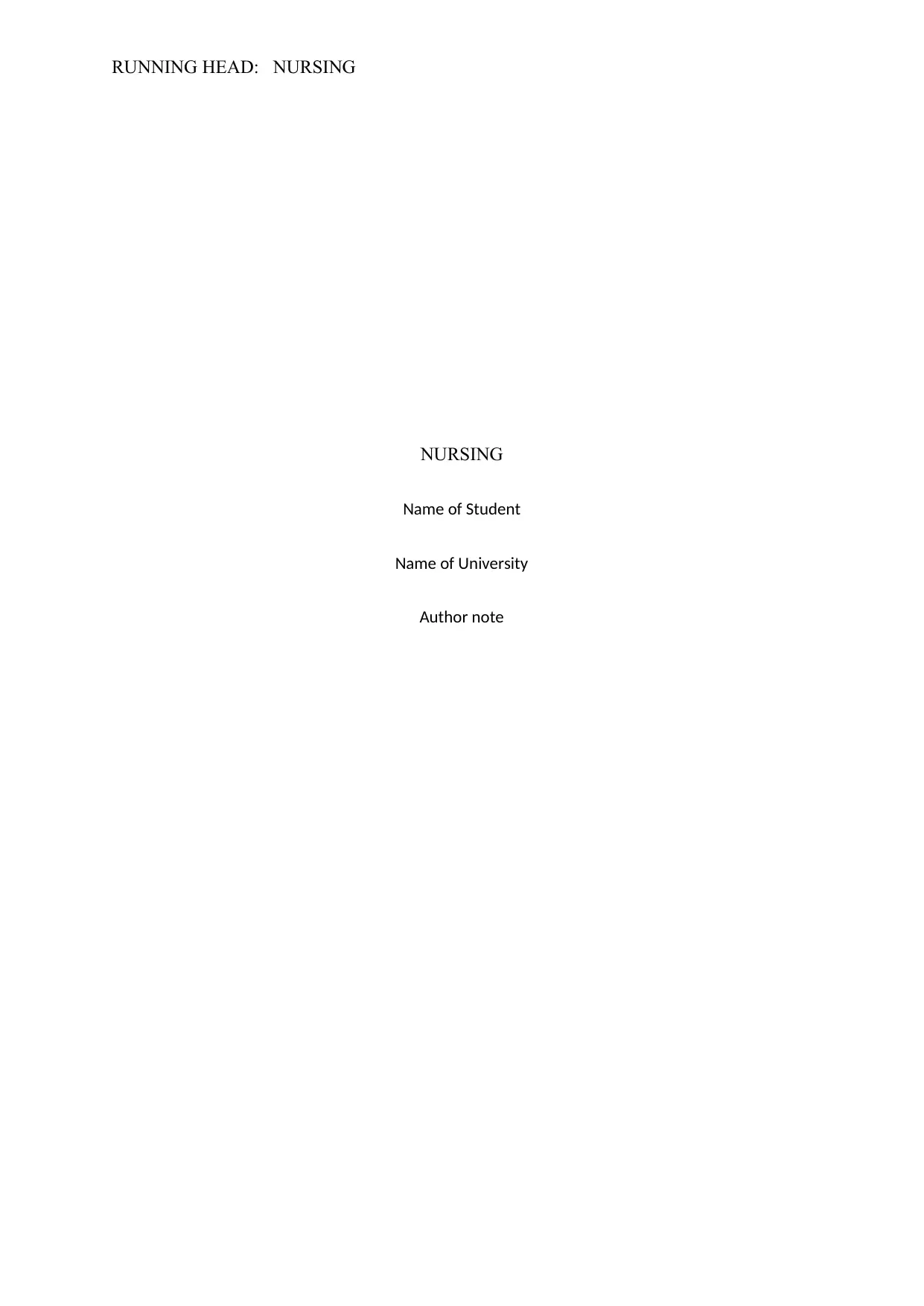
RUNNING HEAD: NURSING
NURSING
Name of Student
Name of University
Author note
NURSING
Name of Student
Name of University
Author note
Paraphrase This Document
Need a fresh take? Get an instant paraphrase of this document with our AI Paraphraser
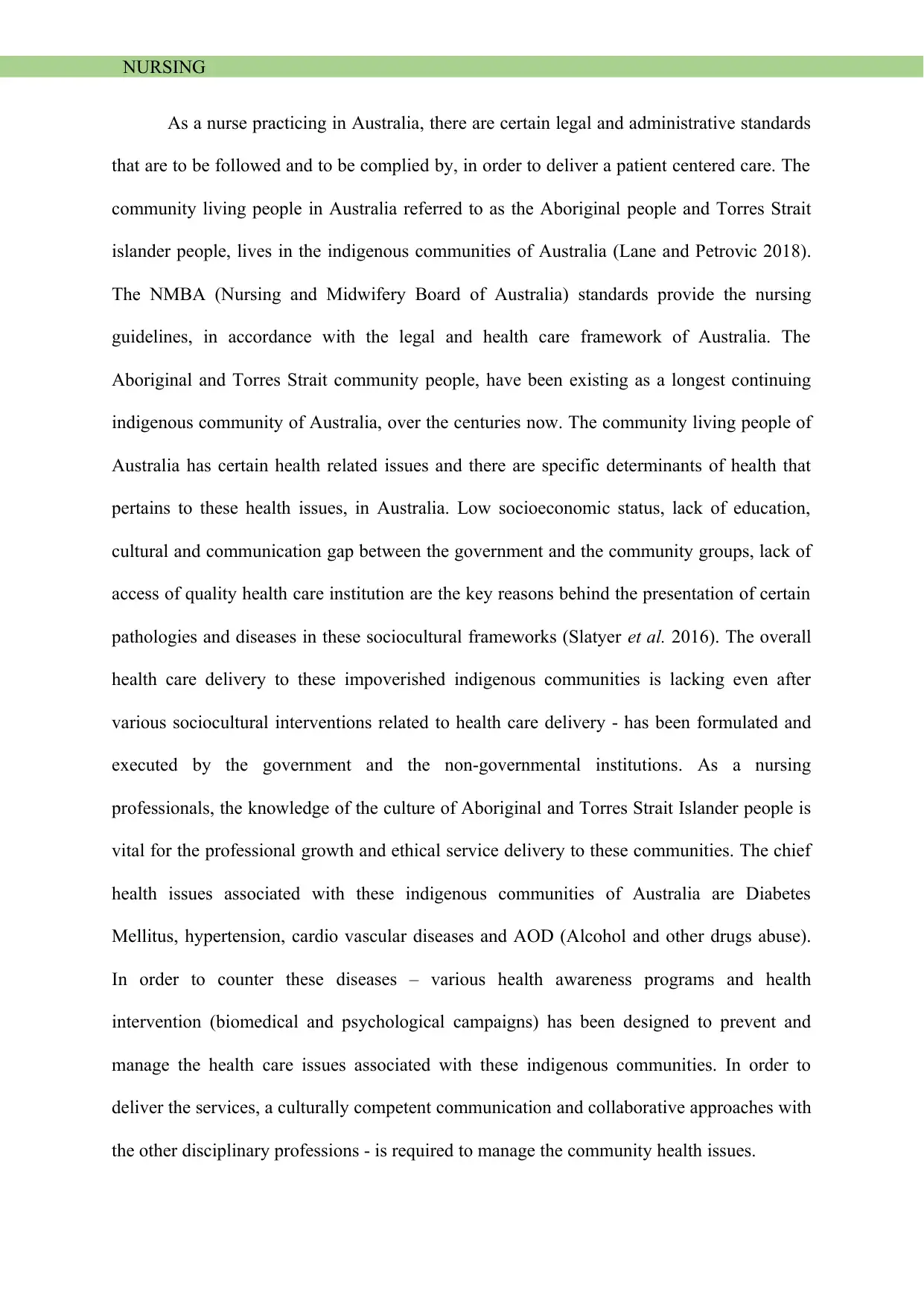
NURSING
As a nurse practicing in Australia, there are certain legal and administrative standards
that are to be followed and to be complied by, in order to deliver a patient centered care. The
community living people in Australia referred to as the Aboriginal people and Torres Strait
islander people, lives in the indigenous communities of Australia (Lane and Petrovic 2018).
The NMBA (Nursing and Midwifery Board of Australia) standards provide the nursing
guidelines, in accordance with the legal and health care framework of Australia. The
Aboriginal and Torres Strait community people, have been existing as a longest continuing
indigenous community of Australia, over the centuries now. The community living people of
Australia has certain health related issues and there are specific determinants of health that
pertains to these health issues, in Australia. Low socioeconomic status, lack of education,
cultural and communication gap between the government and the community groups, lack of
access of quality health care institution are the key reasons behind the presentation of certain
pathologies and diseases in these sociocultural frameworks (Slatyer et al. 2016). The overall
health care delivery to these impoverished indigenous communities is lacking even after
various sociocultural interventions related to health care delivery - has been formulated and
executed by the government and the non-governmental institutions. As a nursing
professionals, the knowledge of the culture of Aboriginal and Torres Strait Islander people is
vital for the professional growth and ethical service delivery to these communities. The chief
health issues associated with these indigenous communities of Australia are Diabetes
Mellitus, hypertension, cardio vascular diseases and AOD (Alcohol and other drugs abuse).
In order to counter these diseases – various health awareness programs and health
intervention (biomedical and psychological campaigns) has been designed to prevent and
manage the health care issues associated with these indigenous communities. In order to
deliver the services, a culturally competent communication and collaborative approaches with
the other disciplinary professions - is required to manage the community health issues.
As a nurse practicing in Australia, there are certain legal and administrative standards
that are to be followed and to be complied by, in order to deliver a patient centered care. The
community living people in Australia referred to as the Aboriginal people and Torres Strait
islander people, lives in the indigenous communities of Australia (Lane and Petrovic 2018).
The NMBA (Nursing and Midwifery Board of Australia) standards provide the nursing
guidelines, in accordance with the legal and health care framework of Australia. The
Aboriginal and Torres Strait community people, have been existing as a longest continuing
indigenous community of Australia, over the centuries now. The community living people of
Australia has certain health related issues and there are specific determinants of health that
pertains to these health issues, in Australia. Low socioeconomic status, lack of education,
cultural and communication gap between the government and the community groups, lack of
access of quality health care institution are the key reasons behind the presentation of certain
pathologies and diseases in these sociocultural frameworks (Slatyer et al. 2016). The overall
health care delivery to these impoverished indigenous communities is lacking even after
various sociocultural interventions related to health care delivery - has been formulated and
executed by the government and the non-governmental institutions. As a nursing
professionals, the knowledge of the culture of Aboriginal and Torres Strait Islander people is
vital for the professional growth and ethical service delivery to these communities. The chief
health issues associated with these indigenous communities of Australia are Diabetes
Mellitus, hypertension, cardio vascular diseases and AOD (Alcohol and other drugs abuse).
In order to counter these diseases – various health awareness programs and health
intervention (biomedical and psychological campaigns) has been designed to prevent and
manage the health care issues associated with these indigenous communities. In order to
deliver the services, a culturally competent communication and collaborative approaches with
the other disciplinary professions - is required to manage the community health issues.
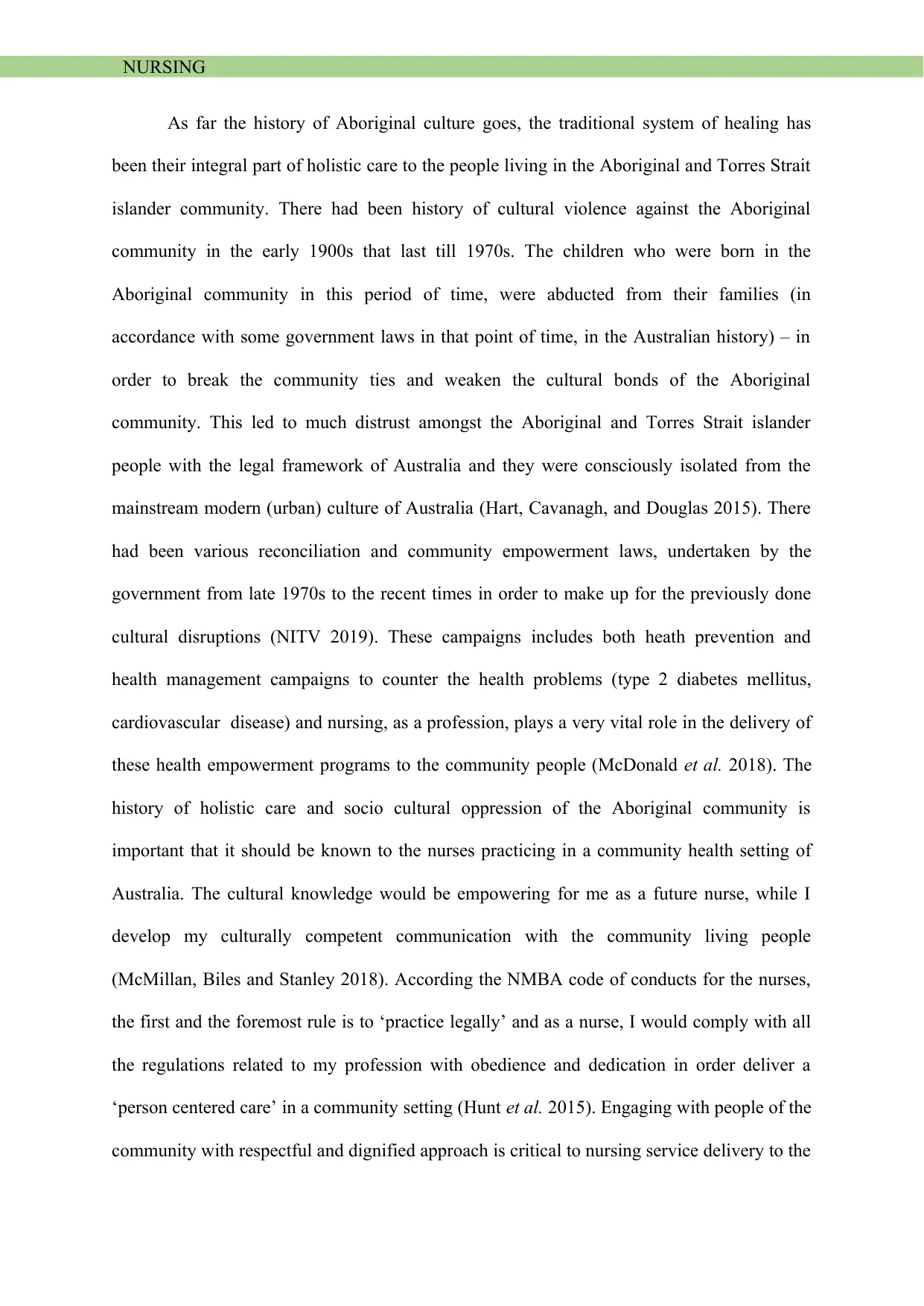
NURSING
As far the history of Aboriginal culture goes, the traditional system of healing has
been their integral part of holistic care to the people living in the Aboriginal and Torres Strait
islander community. There had been history of cultural violence against the Aboriginal
community in the early 1900s that last till 1970s. The children who were born in the
Aboriginal community in this period of time, were abducted from their families (in
accordance with some government laws in that point of time, in the Australian history) – in
order to break the community ties and weaken the cultural bonds of the Aboriginal
community. This led to much distrust amongst the Aboriginal and Torres Strait islander
people with the legal framework of Australia and they were consciously isolated from the
mainstream modern (urban) culture of Australia (Hart, Cavanagh, and Douglas 2015). There
had been various reconciliation and community empowerment laws, undertaken by the
government from late 1970s to the recent times in order to make up for the previously done
cultural disruptions (NITV 2019). These campaigns includes both heath prevention and
health management campaigns to counter the health problems (type 2 diabetes mellitus,
cardiovascular disease) and nursing, as a profession, plays a very vital role in the delivery of
these health empowerment programs to the community people (McDonald et al. 2018). The
history of holistic care and socio cultural oppression of the Aboriginal community is
important that it should be known to the nurses practicing in a community health setting of
Australia. The cultural knowledge would be empowering for me as a future nurse, while I
develop my culturally competent communication with the community living people
(McMillan, Biles and Stanley 2018). According the NMBA code of conducts for the nurses,
the first and the foremost rule is to ‘practice legally’ and as a nurse, I would comply with all
the regulations related to my profession with obedience and dedication in order deliver a
‘person centered care’ in a community setting (Hunt et al. 2015). Engaging with people of the
community with respectful and dignified approach is critical to nursing service delivery to the
As far the history of Aboriginal culture goes, the traditional system of healing has
been their integral part of holistic care to the people living in the Aboriginal and Torres Strait
islander community. There had been history of cultural violence against the Aboriginal
community in the early 1900s that last till 1970s. The children who were born in the
Aboriginal community in this period of time, were abducted from their families (in
accordance with some government laws in that point of time, in the Australian history) – in
order to break the community ties and weaken the cultural bonds of the Aboriginal
community. This led to much distrust amongst the Aboriginal and Torres Strait islander
people with the legal framework of Australia and they were consciously isolated from the
mainstream modern (urban) culture of Australia (Hart, Cavanagh, and Douglas 2015). There
had been various reconciliation and community empowerment laws, undertaken by the
government from late 1970s to the recent times in order to make up for the previously done
cultural disruptions (NITV 2019). These campaigns includes both heath prevention and
health management campaigns to counter the health problems (type 2 diabetes mellitus,
cardiovascular disease) and nursing, as a profession, plays a very vital role in the delivery of
these health empowerment programs to the community people (McDonald et al. 2018). The
history of holistic care and socio cultural oppression of the Aboriginal community is
important that it should be known to the nurses practicing in a community health setting of
Australia. The cultural knowledge would be empowering for me as a future nurse, while I
develop my culturally competent communication with the community living people
(McMillan, Biles and Stanley 2018). According the NMBA code of conducts for the nurses,
the first and the foremost rule is to ‘practice legally’ and as a nurse, I would comply with all
the regulations related to my profession with obedience and dedication in order deliver a
‘person centered care’ in a community setting (Hunt et al. 2015). Engaging with people of the
community with respectful and dignified approach is critical to nursing service delivery to the
⊘ This is a preview!⊘
Do you want full access?
Subscribe today to unlock all pages.

Trusted by 1+ million students worldwide
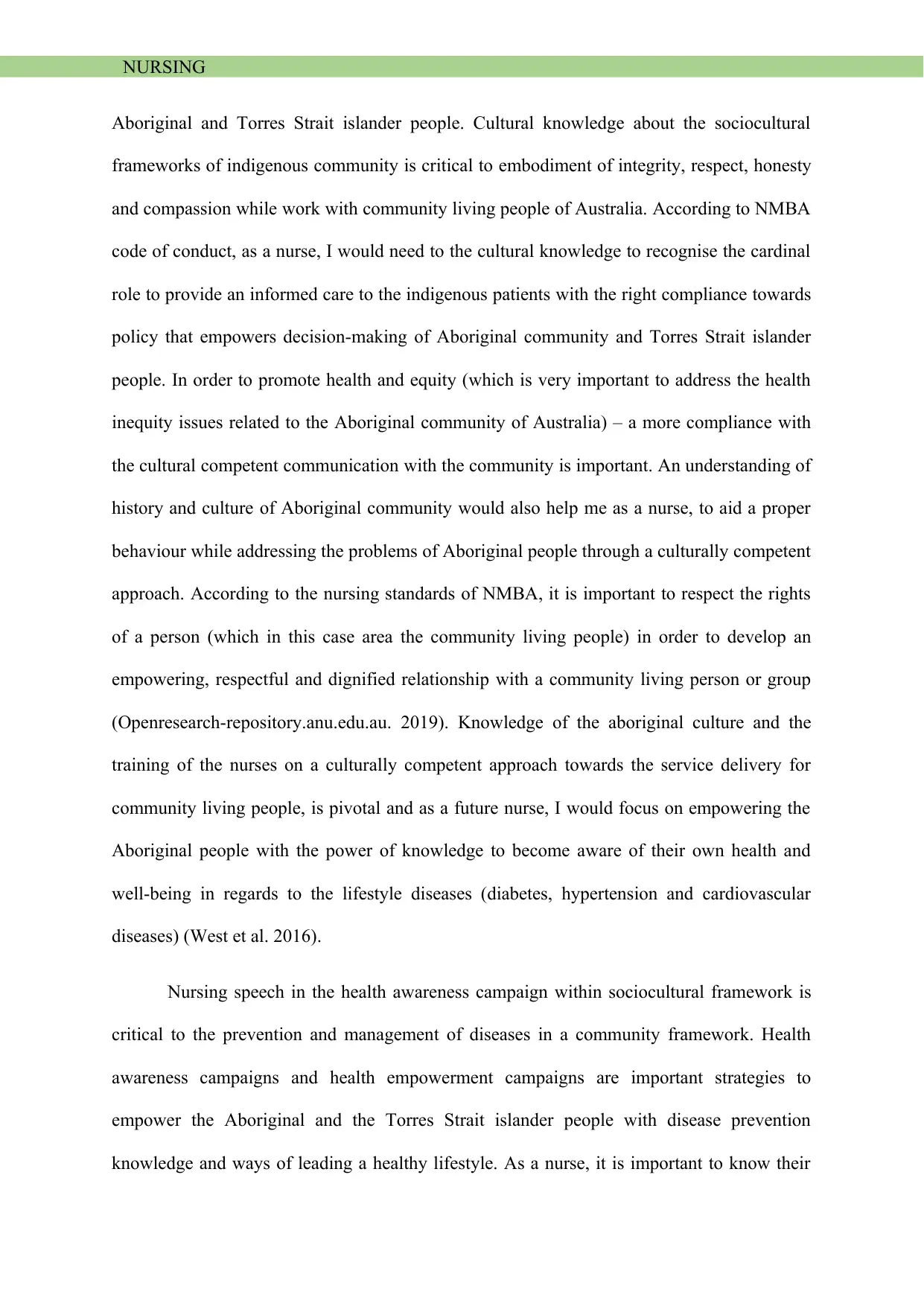
NURSING
Aboriginal and Torres Strait islander people. Cultural knowledge about the sociocultural
frameworks of indigenous community is critical to embodiment of integrity, respect, honesty
and compassion while work with community living people of Australia. According to NMBA
code of conduct, as a nurse, I would need to the cultural knowledge to recognise the cardinal
role to provide an informed care to the indigenous patients with the right compliance towards
policy that empowers decision-making of Aboriginal community and Torres Strait islander
people. In order to promote health and equity (which is very important to address the health
inequity issues related to the Aboriginal community of Australia) – a more compliance with
the cultural competent communication with the community is important. An understanding of
history and culture of Aboriginal community would also help me as a nurse, to aid a proper
behaviour while addressing the problems of Aboriginal people through a culturally competent
approach. According to the nursing standards of NMBA, it is important to respect the rights
of a person (which in this case area the community living people) in order to develop an
empowering, respectful and dignified relationship with a community living person or group
(Openresearch-repository.anu.edu.au. 2019). Knowledge of the aboriginal culture and the
training of the nurses on a culturally competent approach towards the service delivery for
community living people, is pivotal and as a future nurse, I would focus on empowering the
Aboriginal people with the power of knowledge to become aware of their own health and
well-being in regards to the lifestyle diseases (diabetes, hypertension and cardiovascular
diseases) (West et al. 2016).
Nursing speech in the health awareness campaign within sociocultural framework is
critical to the prevention and management of diseases in a community framework. Health
awareness campaigns and health empowerment campaigns are important strategies to
empower the Aboriginal and the Torres Strait islander people with disease prevention
knowledge and ways of leading a healthy lifestyle. As a nurse, it is important to know their
Aboriginal and Torres Strait islander people. Cultural knowledge about the sociocultural
frameworks of indigenous community is critical to embodiment of integrity, respect, honesty
and compassion while work with community living people of Australia. According to NMBA
code of conduct, as a nurse, I would need to the cultural knowledge to recognise the cardinal
role to provide an informed care to the indigenous patients with the right compliance towards
policy that empowers decision-making of Aboriginal community and Torres Strait islander
people. In order to promote health and equity (which is very important to address the health
inequity issues related to the Aboriginal community of Australia) – a more compliance with
the cultural competent communication with the community is important. An understanding of
history and culture of Aboriginal community would also help me as a nurse, to aid a proper
behaviour while addressing the problems of Aboriginal people through a culturally competent
approach. According to the nursing standards of NMBA, it is important to respect the rights
of a person (which in this case area the community living people) in order to develop an
empowering, respectful and dignified relationship with a community living person or group
(Openresearch-repository.anu.edu.au. 2019). Knowledge of the aboriginal culture and the
training of the nurses on a culturally competent approach towards the service delivery for
community living people, is pivotal and as a future nurse, I would focus on empowering the
Aboriginal people with the power of knowledge to become aware of their own health and
well-being in regards to the lifestyle diseases (diabetes, hypertension and cardiovascular
diseases) (West et al. 2016).
Nursing speech in the health awareness campaign within sociocultural framework is
critical to the prevention and management of diseases in a community framework. Health
awareness campaigns and health empowerment campaigns are important strategies to
empower the Aboriginal and the Torres Strait islander people with disease prevention
knowledge and ways of leading a healthy lifestyle. As a nurse, it is important to know their
Paraphrase This Document
Need a fresh take? Get an instant paraphrase of this document with our AI Paraphraser
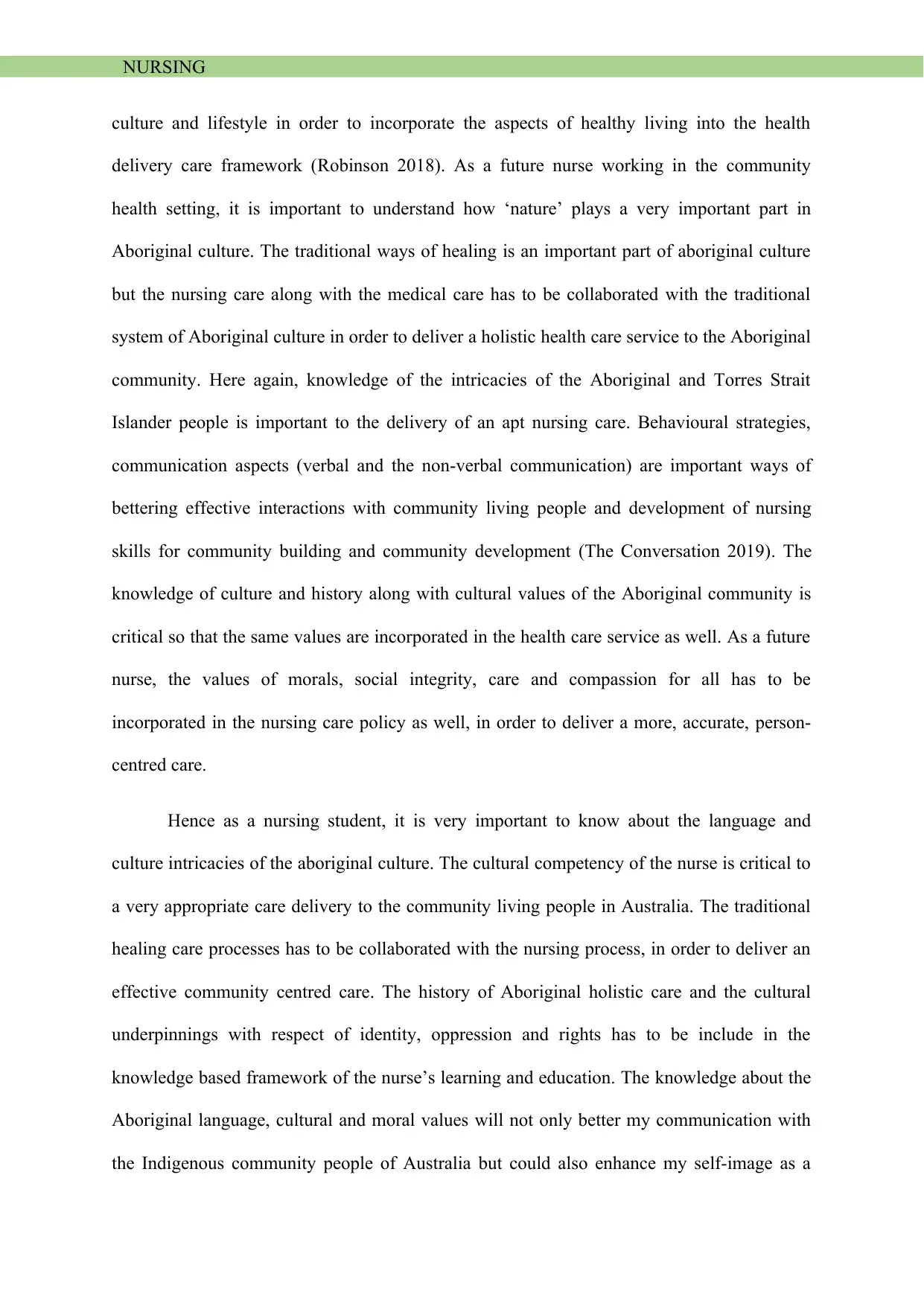
NURSING
culture and lifestyle in order to incorporate the aspects of healthy living into the health
delivery care framework (Robinson 2018). As a future nurse working in the community
health setting, it is important to understand how ‘nature’ plays a very important part in
Aboriginal culture. The traditional ways of healing is an important part of aboriginal culture
but the nursing care along with the medical care has to be collaborated with the traditional
system of Aboriginal culture in order to deliver a holistic health care service to the Aboriginal
community. Here again, knowledge of the intricacies of the Aboriginal and Torres Strait
Islander people is important to the delivery of an apt nursing care. Behavioural strategies,
communication aspects (verbal and the non-verbal communication) are important ways of
bettering effective interactions with community living people and development of nursing
skills for community building and community development (The Conversation 2019). The
knowledge of culture and history along with cultural values of the Aboriginal community is
critical so that the same values are incorporated in the health care service as well. As a future
nurse, the values of morals, social integrity, care and compassion for all has to be
incorporated in the nursing care policy as well, in order to deliver a more, accurate, person-
centred care.
Hence as a nursing student, it is very important to know about the language and
culture intricacies of the aboriginal culture. The cultural competency of the nurse is critical to
a very appropriate care delivery to the community living people in Australia. The traditional
healing care processes has to be collaborated with the nursing process, in order to deliver an
effective community centred care. The history of Aboriginal holistic care and the cultural
underpinnings with respect of identity, oppression and rights has to be include in the
knowledge based framework of the nurse’s learning and education. The knowledge about the
Aboriginal language, cultural and moral values will not only better my communication with
the Indigenous community people of Australia but could also enhance my self-image as a
culture and lifestyle in order to incorporate the aspects of healthy living into the health
delivery care framework (Robinson 2018). As a future nurse working in the community
health setting, it is important to understand how ‘nature’ plays a very important part in
Aboriginal culture. The traditional ways of healing is an important part of aboriginal culture
but the nursing care along with the medical care has to be collaborated with the traditional
system of Aboriginal culture in order to deliver a holistic health care service to the Aboriginal
community. Here again, knowledge of the intricacies of the Aboriginal and Torres Strait
Islander people is important to the delivery of an apt nursing care. Behavioural strategies,
communication aspects (verbal and the non-verbal communication) are important ways of
bettering effective interactions with community living people and development of nursing
skills for community building and community development (The Conversation 2019). The
knowledge of culture and history along with cultural values of the Aboriginal community is
critical so that the same values are incorporated in the health care service as well. As a future
nurse, the values of morals, social integrity, care and compassion for all has to be
incorporated in the nursing care policy as well, in order to deliver a more, accurate, person-
centred care.
Hence as a nursing student, it is very important to know about the language and
culture intricacies of the aboriginal culture. The cultural competency of the nurse is critical to
a very appropriate care delivery to the community living people in Australia. The traditional
healing care processes has to be collaborated with the nursing process, in order to deliver an
effective community centred care. The history of Aboriginal holistic care and the cultural
underpinnings with respect of identity, oppression and rights has to be include in the
knowledge based framework of the nurse’s learning and education. The knowledge about the
Aboriginal language, cultural and moral values will not only better my communication with
the Indigenous community people of Australia but could also enhance my self-image as a
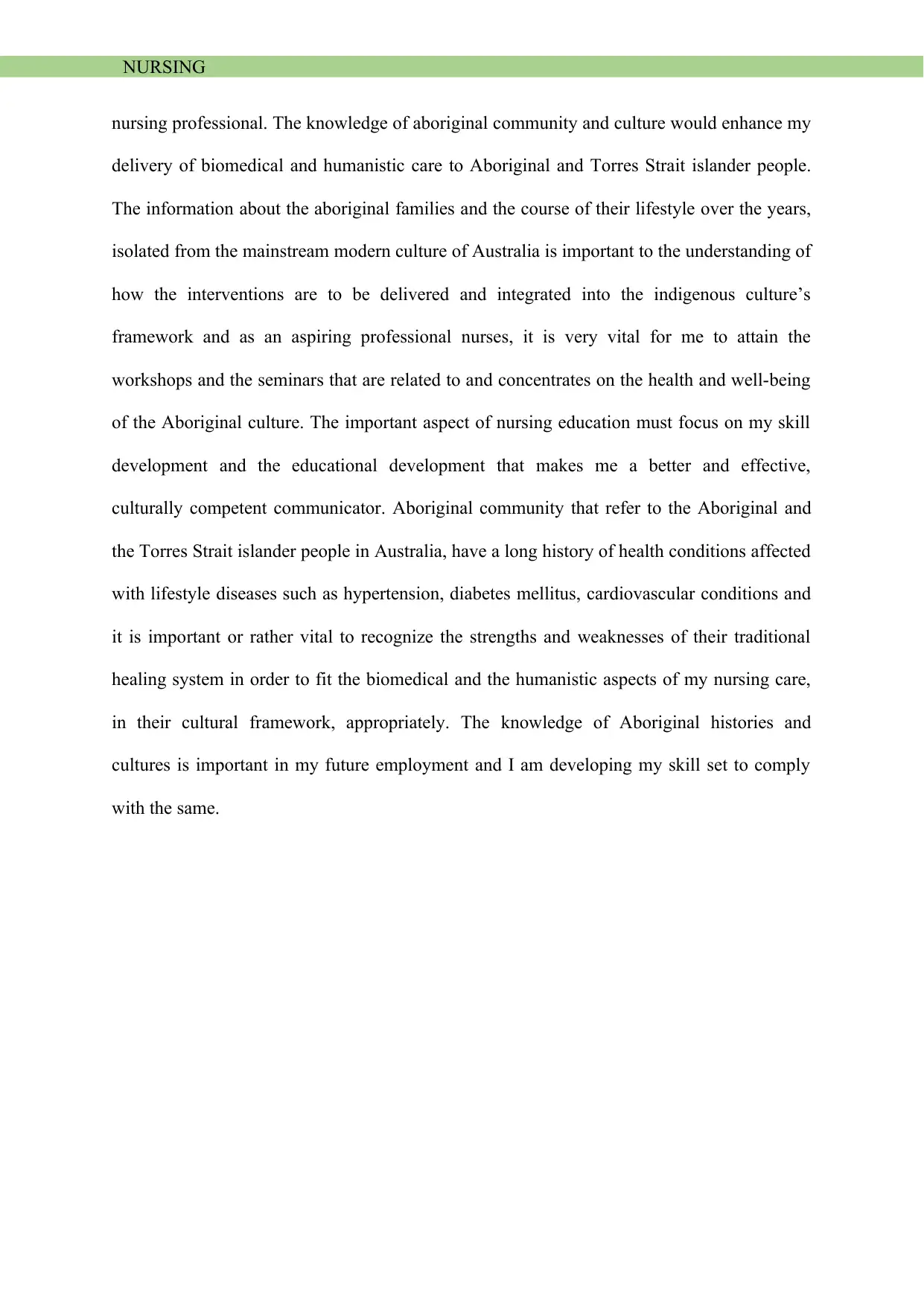
NURSING
nursing professional. The knowledge of aboriginal community and culture would enhance my
delivery of biomedical and humanistic care to Aboriginal and Torres Strait islander people.
The information about the aboriginal families and the course of their lifestyle over the years,
isolated from the mainstream modern culture of Australia is important to the understanding of
how the interventions are to be delivered and integrated into the indigenous culture’s
framework and as an aspiring professional nurses, it is very vital for me to attain the
workshops and the seminars that are related to and concentrates on the health and well-being
of the Aboriginal culture. The important aspect of nursing education must focus on my skill
development and the educational development that makes me a better and effective,
culturally competent communicator. Aboriginal community that refer to the Aboriginal and
the Torres Strait islander people in Australia, have a long history of health conditions affected
with lifestyle diseases such as hypertension, diabetes mellitus, cardiovascular conditions and
it is important or rather vital to recognize the strengths and weaknesses of their traditional
healing system in order to fit the biomedical and the humanistic aspects of my nursing care,
in their cultural framework, appropriately. The knowledge of Aboriginal histories and
cultures is important in my future employment and I am developing my skill set to comply
with the same.
nursing professional. The knowledge of aboriginal community and culture would enhance my
delivery of biomedical and humanistic care to Aboriginal and Torres Strait islander people.
The information about the aboriginal families and the course of their lifestyle over the years,
isolated from the mainstream modern culture of Australia is important to the understanding of
how the interventions are to be delivered and integrated into the indigenous culture’s
framework and as an aspiring professional nurses, it is very vital for me to attain the
workshops and the seminars that are related to and concentrates on the health and well-being
of the Aboriginal culture. The important aspect of nursing education must focus on my skill
development and the educational development that makes me a better and effective,
culturally competent communicator. Aboriginal community that refer to the Aboriginal and
the Torres Strait islander people in Australia, have a long history of health conditions affected
with lifestyle diseases such as hypertension, diabetes mellitus, cardiovascular conditions and
it is important or rather vital to recognize the strengths and weaknesses of their traditional
healing system in order to fit the biomedical and the humanistic aspects of my nursing care,
in their cultural framework, appropriately. The knowledge of Aboriginal histories and
cultures is important in my future employment and I am developing my skill set to comply
with the same.
⊘ This is a preview!⊘
Do you want full access?
Subscribe today to unlock all pages.

Trusted by 1+ million students worldwide
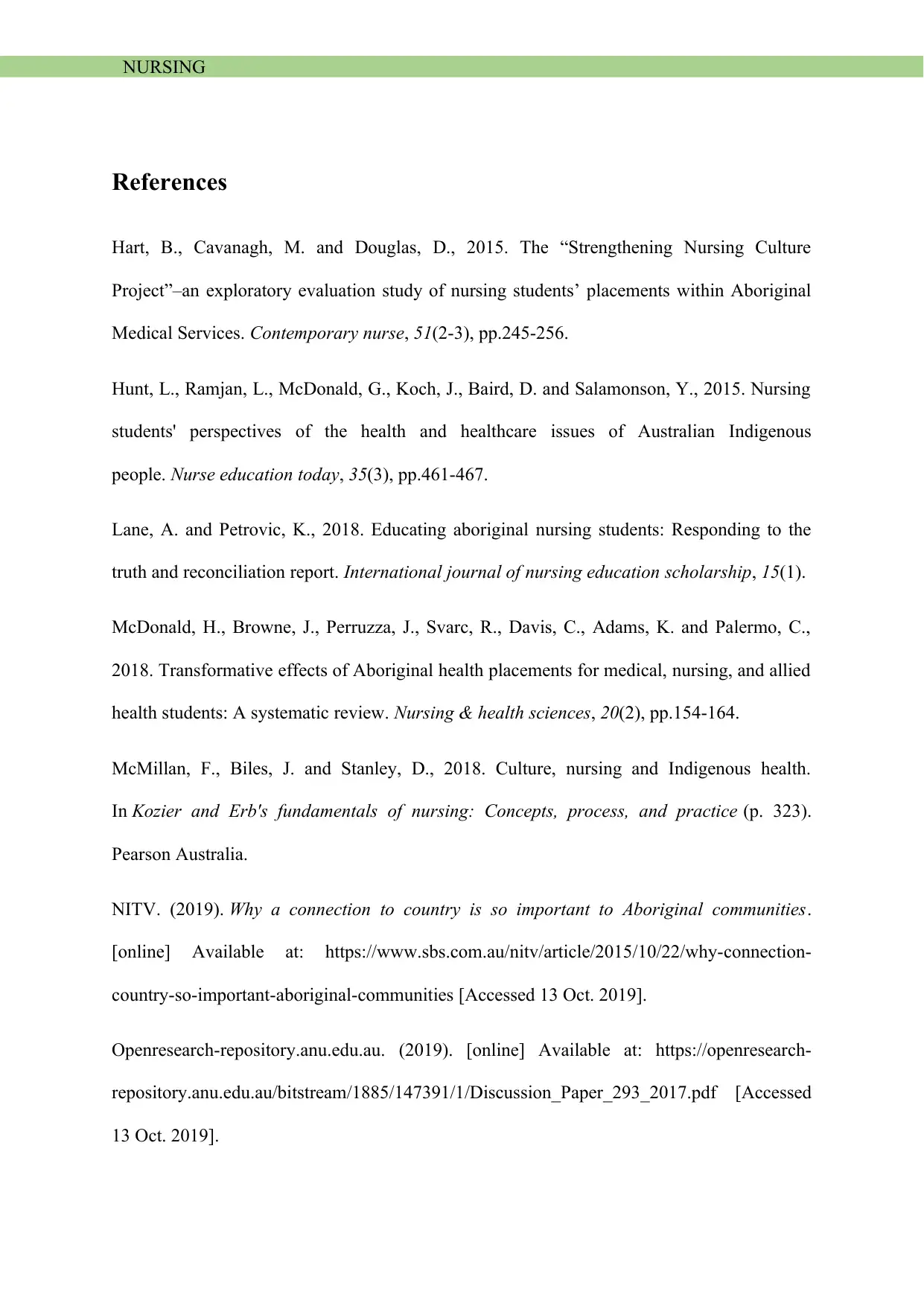
NURSING
References
Hart, B., Cavanagh, M. and Douglas, D., 2015. The “Strengthening Nursing Culture
Project”–an exploratory evaluation study of nursing students’ placements within Aboriginal
Medical Services. Contemporary nurse, 51(2-3), pp.245-256.
Hunt, L., Ramjan, L., McDonald, G., Koch, J., Baird, D. and Salamonson, Y., 2015. Nursing
students' perspectives of the health and healthcare issues of Australian Indigenous
people. Nurse education today, 35(3), pp.461-467.
Lane, A. and Petrovic, K., 2018. Educating aboriginal nursing students: Responding to the
truth and reconciliation report. International journal of nursing education scholarship, 15(1).
McDonald, H., Browne, J., Perruzza, J., Svarc, R., Davis, C., Adams, K. and Palermo, C.,
2018. Transformative effects of Aboriginal health placements for medical, nursing, and allied
health students: A systematic review. Nursing & health sciences, 20(2), pp.154-164.
McMillan, F., Biles, J. and Stanley, D., 2018. Culture, nursing and Indigenous health.
In Kozier and Erb's fundamentals of nursing: Concepts, process, and practice (p. 323).
Pearson Australia.
NITV. (2019). Why a connection to country is so important to Aboriginal communities.
[online] Available at: https://www.sbs.com.au/nitv/article/2015/10/22/why-connection-
country-so-important-aboriginal-communities [Accessed 13 Oct. 2019].
Openresearch-repository.anu.edu.au. (2019). [online] Available at: https://openresearch-
repository.anu.edu.au/bitstream/1885/147391/1/Discussion_Paper_293_2017.pdf [Accessed
13 Oct. 2019].
References
Hart, B., Cavanagh, M. and Douglas, D., 2015. The “Strengthening Nursing Culture
Project”–an exploratory evaluation study of nursing students’ placements within Aboriginal
Medical Services. Contemporary nurse, 51(2-3), pp.245-256.
Hunt, L., Ramjan, L., McDonald, G., Koch, J., Baird, D. and Salamonson, Y., 2015. Nursing
students' perspectives of the health and healthcare issues of Australian Indigenous
people. Nurse education today, 35(3), pp.461-467.
Lane, A. and Petrovic, K., 2018. Educating aboriginal nursing students: Responding to the
truth and reconciliation report. International journal of nursing education scholarship, 15(1).
McDonald, H., Browne, J., Perruzza, J., Svarc, R., Davis, C., Adams, K. and Palermo, C.,
2018. Transformative effects of Aboriginal health placements for medical, nursing, and allied
health students: A systematic review. Nursing & health sciences, 20(2), pp.154-164.
McMillan, F., Biles, J. and Stanley, D., 2018. Culture, nursing and Indigenous health.
In Kozier and Erb's fundamentals of nursing: Concepts, process, and practice (p. 323).
Pearson Australia.
NITV. (2019). Why a connection to country is so important to Aboriginal communities.
[online] Available at: https://www.sbs.com.au/nitv/article/2015/10/22/why-connection-
country-so-important-aboriginal-communities [Accessed 13 Oct. 2019].
Openresearch-repository.anu.edu.au. (2019). [online] Available at: https://openresearch-
repository.anu.edu.au/bitstream/1885/147391/1/Discussion_Paper_293_2017.pdf [Accessed
13 Oct. 2019].
Paraphrase This Document
Need a fresh take? Get an instant paraphrase of this document with our AI Paraphraser
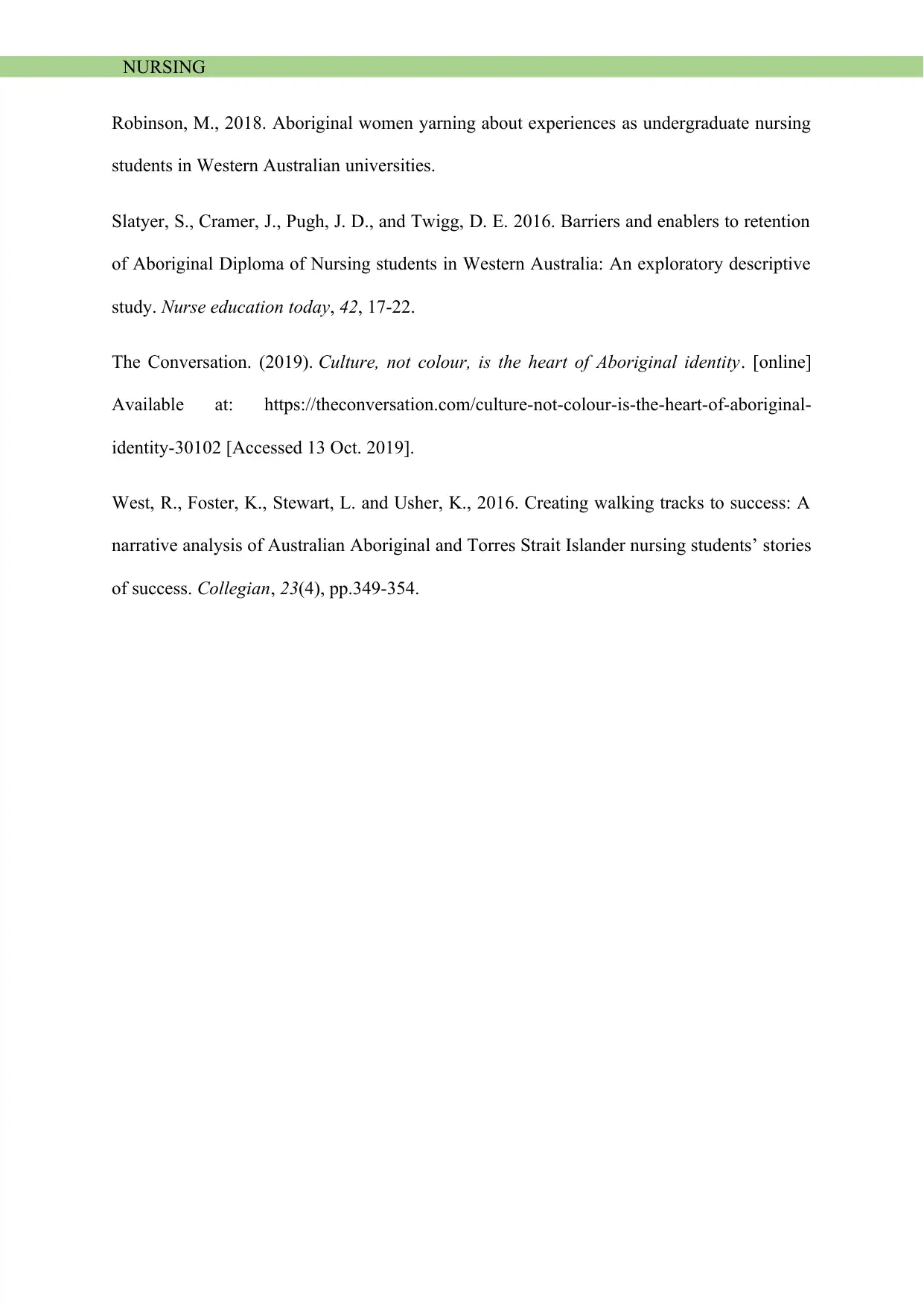
NURSING
Robinson, M., 2018. Aboriginal women yarning about experiences as undergraduate nursing
students in Western Australian universities.
Slatyer, S., Cramer, J., Pugh, J. D., and Twigg, D. E. 2016. Barriers and enablers to retention
of Aboriginal Diploma of Nursing students in Western Australia: An exploratory descriptive
study. Nurse education today, 42, 17-22.
The Conversation. (2019). Culture, not colour, is the heart of Aboriginal identity. [online]
Available at: https://theconversation.com/culture-not-colour-is-the-heart-of-aboriginal-
identity-30102 [Accessed 13 Oct. 2019].
West, R., Foster, K., Stewart, L. and Usher, K., 2016. Creating walking tracks to success: A
narrative analysis of Australian Aboriginal and Torres Strait Islander nursing students’ stories
of success. Collegian, 23(4), pp.349-354.
Robinson, M., 2018. Aboriginal women yarning about experiences as undergraduate nursing
students in Western Australian universities.
Slatyer, S., Cramer, J., Pugh, J. D., and Twigg, D. E. 2016. Barriers and enablers to retention
of Aboriginal Diploma of Nursing students in Western Australia: An exploratory descriptive
study. Nurse education today, 42, 17-22.
The Conversation. (2019). Culture, not colour, is the heart of Aboriginal identity. [online]
Available at: https://theconversation.com/culture-not-colour-is-the-heart-of-aboriginal-
identity-30102 [Accessed 13 Oct. 2019].
West, R., Foster, K., Stewart, L. and Usher, K., 2016. Creating walking tracks to success: A
narrative analysis of Australian Aboriginal and Torres Strait Islander nursing students’ stories
of success. Collegian, 23(4), pp.349-354.
1 out of 8
Related Documents
Your All-in-One AI-Powered Toolkit for Academic Success.
+13062052269
info@desklib.com
Available 24*7 on WhatsApp / Email
![[object Object]](/_next/static/media/star-bottom.7253800d.svg)
Unlock your academic potential
Copyright © 2020–2026 A2Z Services. All Rights Reserved. Developed and managed by ZUCOL.





